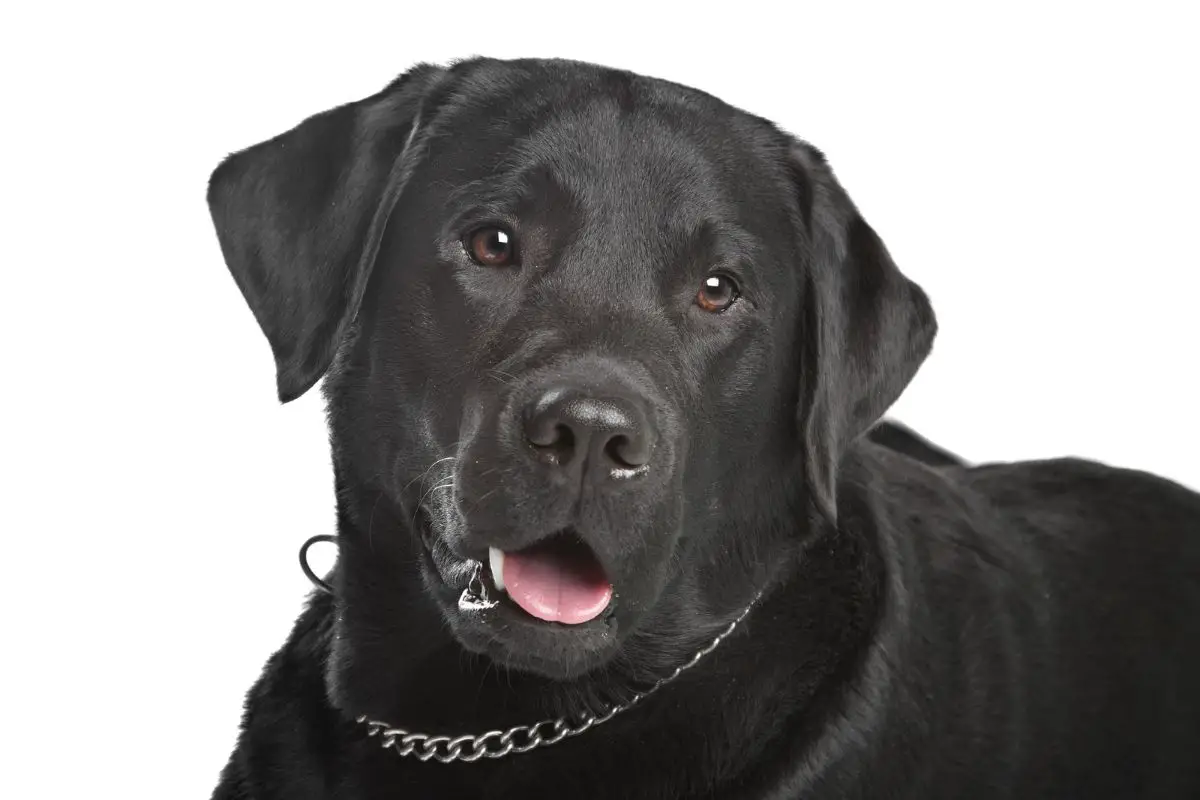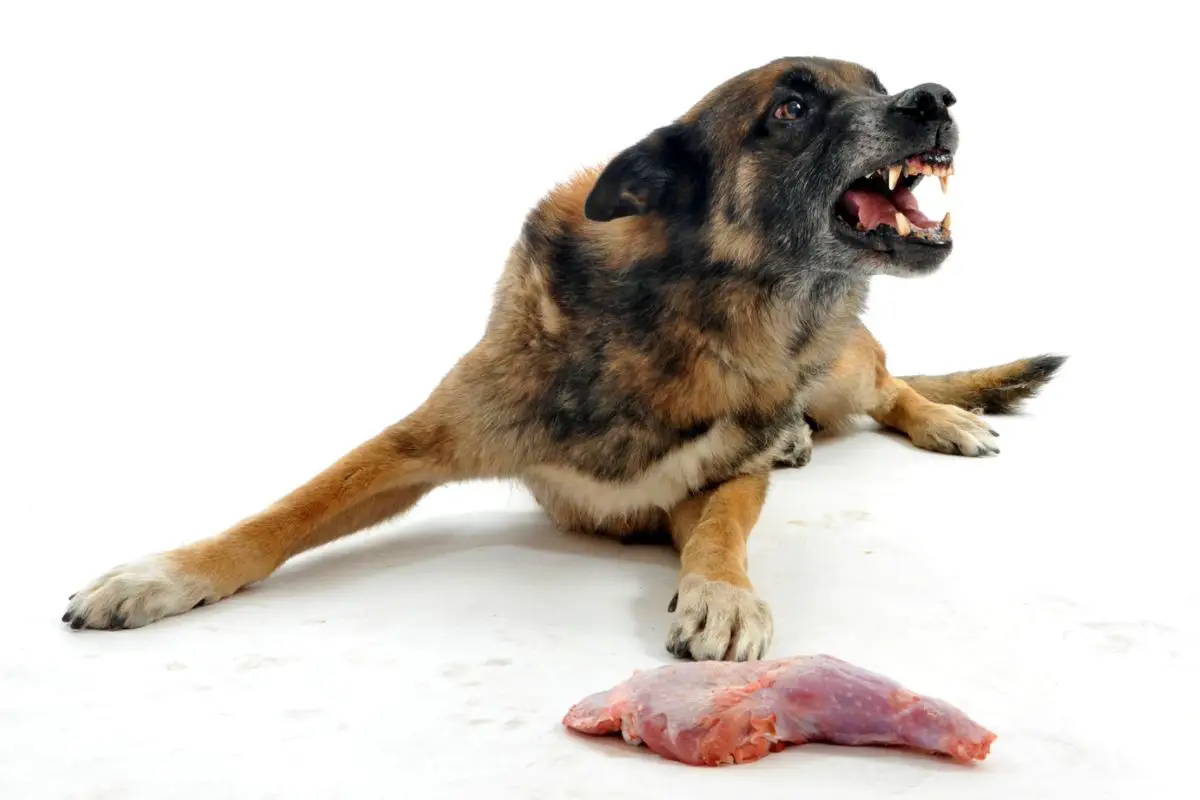This post contains affiliate links.
No one enjoys knowing that their pet is ill, and if your dog is vomiting, it could be a sign of sickness. If your dog throws up undigested food, you might feel even more worried. So, why is your dog throwing up undigested food?
Your dog is throwing up undigested food because he’s expelling a foreign object, vomiting, eating too much or too fast, or is overly excited. He might also have an esophageal condition, throat cancer, or rabies. Poisoning can also cause regurgitation.
Read further for an in-depth explanation of why your dog could be throwing up undigested food. This article will also discuss what you can do to help relieve your dog’s symptoms.
Table of Contents
Reasons Your Dog Throws Up Undigested Food
Throwing up undigested food is known as regurgitation. It’s different from vomiting because the food has not yet entered the stomach and is still in the esophagus (food pipe). The regurgitated food can contain saliva and look similar to how you presented it to your dog. It might look a little mushy if he has chewed it well.
When dogs regurgitate, it often happens suddenly and sounds like a burp. Sometimes, the larynx (or voice box) doesn’t have time to close and protect the dog’s airway, and the regurgitated food can enter the trachea or windpipe and cause aspiration pneumonia.
There could be various reasons your dog throws up undigested food, and only your vet is qualified to diagnose the problem correctly. While you’re waiting to consult with your vet, here are the most common reasons your dog is throwing up undigested food:
Your Dog Is Expelling a Foreign Object
If you’ve owned a dog for even a short while, you’ll know that they’re notorious for exploring interesting objects through taste.
Your dog might have been carrying around a small object in their mouth and decided to have a snack as well. Or, they could have had something in their mouth when you called them for dinner and didn’t think to expel the object out of excitement.
After eating for a few seconds, your dog could have accidentally swallowed the foreign object. Their esophagus would react by contracting the muscles surrounding it to expel the object and anything else in it.
If you notice a strange object in the undigested food, this could be why.
Your Dog Is Eating Excessively
Everyone knows that dogs love food, and you might feel that you’re spoiling your dog by feeding them extra snacks or more than the recommended amount for their age and breed.
Most dogs, unfortunately, will simply eat until the food is finished, and they might not notice that their stomachs are full yet.
If you feed your dog excessive amounts, they could throw up some undigested food as their stomach won’t allow it to enter toward the end of the meal. Thankfully, you can solve this problem quickly by feeding your dog less!
Your Dog Is Excited
Another common canine trait is being excited at mealtimes. This happens more commonly with younger dogs and puppies, and their over-excitement can cause them to eat and drink too fast and throw up undigested food.
If you think this might be the problem, try to calm your dog down just before mealtimes. Having them lie down next to you and petting them can make them feel calm. When your dog seems relaxed enough, slowly introduce the meal to prevent them from getting all excited again.
Alternatively, you could try a slow-feeder (or anti-gulp) bowl to encourage them to eat slower. Doing this can reduce the likelihood of your dog regurgitating undigested food.
Your Dog Is Stressed
Stress can also cause dogs to become overly anxious at mealtimes and throw up undigested food.
If you have more than one dog and they share a food bowl, your dog might feel stressed as they’re competing with the other dogs to ensure that they get his fair share of the food. An easy fix for this is getting each dog their own food bowl and spacing them apart.
Other causes of stress include introducing or losing a family member or pet, being away from home, or separation anxiety.
Your Dog Has an Esophageal Condition
Your dog throwing up undigested food could be due to an esophageal condition. This is a more severe cause of regurgitation, and you should consult your vet as soon as possible if you think that this is the cause.
Esophageal conditions are often accompanied by other symptoms like difficulty swallowing, weight loss, and drooling.
Below are some common esophageal conditions in dogs:
Dilated Esophagus (Megaesophagus)
Megaesophagus causes a dog’s esophagus to enlarge. It would seem logical that a dilated esophagus would allow food to pass to the stomach more quickly. Still, this condition is caused by the esophageal muscles failing and not gently contracting to move the food.
Food can become dislodged in the esophagus, but it may spontaneously propel out of your dog’s mouth.
Myasthenia gravis, a severe neuromuscular disease, can often cause a dilated esophagus, so it’s best to get your dog veterinary attention as soon as possible.
Barrett’s Esophagus
If your dog has acid reflux, stomach acid can irritate the esophagus’s lining, causing it to become red and inflamed. This can make it painful for your dog to swallow food, and the esophagus might not be able to handle a normal amount of food traveling down to the stomach.
Cricopharyngeal Achalasia
Cricopharyngeal achalasia is a swallowing disorder that prevents the food from moving from the throat (or pharynx), and into the esophagus. Thankfully, it’s a rare canine condition, but you should be alert if your dog is a springer or cocker spaniel, as it is more prevalent in these breeds.
Esophageal Dysmotility
Vets aren’t sure exactly what causes esophageal dysmotility, but it can happen when your dog has been injured in the throat area or if the esophagus has recently been inflamed.
Like megaesophagus, esophageal dysmotility affects the muscles in the windpipe, and it can prevent the food from passing into the stomach effectively, causing your dog to regurgitate undigested food.
Esophageal Stricture
Esophageal stricture causes a dog’s esophagus to narrow, making swallowing difficult or impossible. A common sign of esophageal stricture is throwing up undigested food.
Your dog might have esophageal stricture if he has recently chewed a toy and a piece has broken off and injured his esophagus. He may have also swallowed a sharp object that damaged the esophageal lining.
Anesthesia can also sometimes cause esophageal stricture.
Esophagitis
Esophagitis is the inflammation of the esophagus caused by the backflow of the stomach acid into the food pipe. This most often happens if your dog has GERD (gastroesophageal reflux disorder).
Signs that your dog might have esophagitis or GERD include:
- Throwing up undigested food
- Vomiting
- Excessive burping
- Drooling
- Smelly breath
- Licking aimlessly to try and swallow the irritating stomach acids
If your vet suspects that your dog has GERD, they’ll most likely ask you to change your dog’s diet.
Esophageal Cancer
Esophageal cancer is, thankfully, rare in dogs. Still, if your dog has this condition, there may be a malignant tumor in the windpipe obstructing it, causing your dog to regurgitate his undigested food.
If you have ruled out the other possible esophageal conditions mentioned above yet your dog is still regurgitating food, it may be best to visit a veterinarian and get a thorough checkup. It can help you detect the condition earlier and have higher chances of treating it.
Your Dog Is Vomiting
Vomiting can cause your dog to throw up undigested food. When dogs vomit, bile moves from the stomach or small intestine and into the esophagus. The dog’s abdomen contracts simultaneously, causing the stomach contents (and anything that’s been recently consumed and undigested) to be vomited out.
However, vomiting rarely causes dogs to throw up undigested food because it’s usually accompanied by nausea, causing your dog to be reluctant to eat.
Your Dog Has Rabies
Rabies is a fatal disease for dogs, making rabies vaccinations crucial for your canine companions. If your dog hasn’t had a rabies vaccination and contracts the disease, one of the symptoms could be throwing up undigested food.
Sadly, there’s no cure once your dog has rabies, so you should always ensure that his rabies vaccination is up to date.
Your Dog Has Throat Cancer
Throat cancer in dogs can present with one or more tumors in the throat. As the tumor grows, it can put pressure on the esophagus and make swallowing and eating painful and difficult for your dog. One of the symptoms of canine throat cancer is regurgitating undigested food.
Your Dog Has Been Poisoned
Dogs are naturally curious animals and love exploring new objects. Unfortunately, they can sometimes ingest things they shouldn’t, which can sometimes be poisonous.
Vomiting is a common sign of poisoning in dogs, but throwing up undigested food could also indicate it. If you think your dog’s been poisoned, you should immediately take him to the vet.
What’s the Outlook for Dogs Throwing Up Undigested Food?
Now that you know about the possible causes of dogs throwing up undigested food, what’s the outlook if this is happening to your dog?
The outlook for dogs throwing up undigested food is usually optimistic as long as you seek veterinary care as soon as possible. If your dog was regurgitating food due to eating too fast or being overly excited, the outlook is bright once you stop such behaviors.
The outlook is optimistic because most conditions can be easily treated if they’re detected early enough.
What Should I Do if My Dog Throws Up Undigested Food?
It’s never easy watching your dog vomit or regurgitate but is there anything you can do to help them?
If your dog throws up undigested food, you should monitor them closely, observe the regurgitated food, and try and pinpoint the cause. This information may help your vet provide an accurate diagnosis and a suitable course of treatment.
As disgusting as it may sound, take a close look at the regurgitated food and note if it contains a lot of saliva, mucus, foreign objects, or blood. It’s important to relay this information to your vet, and if you think you’ll forget, take a photo of it before cleaning it up.
As always, give your dog plenty of love and attention as they might not be feeling well.
Is Regurgitating More Serious Than Vomiting?
When your dog regurgitates, it can seem unnatural and worrying, while vomiting seems more common and benign. So, which one is more serious – regurgitating or vomiting?
Regurgitating and vomiting among dogs can be equally serious depending on the cause. Both can have severe and benign causes, and it’s essential to monitor your dog closely and take them to the vet if the vomiting or regurgitation doesn’t stop.
Dogs can vomit for various reasons, and these include the following:
- Bacterial or viral Illness. Like humans, dogs can contract bacterial or viral illnesses that make them feel nauseous. Gastrointestinal infections commonly cause nausea in dogs.
- Overeating or eating too quickly. Your dog can regurgitate if they have overeaten or eaten too quickly, which is valid for vomiting, too.
- Motion sickness. Motion sickness is common in young dogs and puppies, and many dogs grow out of it. However, if your adult dog still gets motion sickness, you might consider anti-nausea medication for long car trips.
- Medication or supplements. Medication and supplements, such as antibiotics, probiotics, and painkillers, can make your dog feel queasy and vomit.
- Dietary changes. If you’ve recently changed your dog’s food, his stomach may not be used to it, causing them to vomit. When introducing new food to your dog, do so gradually to prevent vomiting and diarrhea.
- Poisoning. If your dog has consumed a poisonous substance or plant, they may start vomiting and foaming at the mouth. In this case, you should take them to the vet immediately.
- Eating a non-edible item. Dogs shouldn’t eat chocolate, garlic, foxgloves, sweet peas, oleander, or mushrooms. Although these substances probably won’t kill your dog, their body might reject the item by vomiting it out.
- Colon cancer or obstruction. If your dog has a malignant tumor in the colon, they can lose weight, vomit, and have ongoing diarrhea. A colon obstruction can also exhibit the same symptoms.
If your dog is vomiting, it could be serious when it’s accompanied by any of the following symptoms:
- Weight loss
- Blood in the vomit or feces
- Lethargy
- Dehydration
Final Thoughts
There are many reasons a dog might throw up undigested food, and your vet is always the best person to provide a final diagnosis. However, here are the main reasons:
- Simultaneous vomiting or foreign object expulsion
- Overeating or eating too quickly
- Overexcitement or stress
- An esophageal condition
- Rabies
- Throat cancer
- Poisoning
Addressing these reasons may keep your dog from regurgitating. Don’t hesitate to seek a vet’s help for a more accurate diagnosis and a more efficient treatment.
Mrdogfood.com is a participant in the Amazon Services LLC Associates Program, an affiliate advertising program designed to provide a means for sites to earn advertising fees by advertising and linking to Amazon.com. We also participate in other affiliate programs which compensate us for referring traffic.




